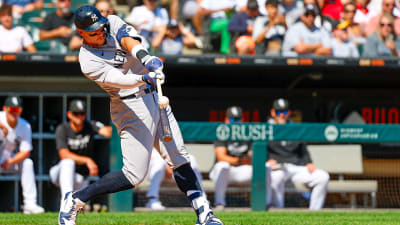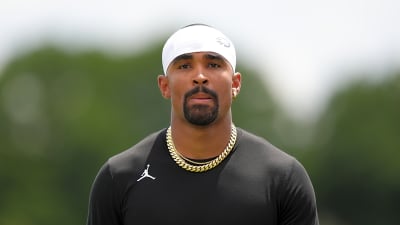Some clubs get multiple great campaigns from players in a season. You don’t have a year like Manchester City or Arsenal if a few players aren’t stellar on the pitch. Conversely, even the worst teams in the Premier League — including woeful Sheffield United — have a best player. So, with the 2023-24 Premier League season wrapped up, who was every team’s top player? Here are our picks.
1 of 20
Arsenal: Bukayo Saka
Marc Atkins/Getty Images
Both Declan Rice and Martin Odegaard have gotten love as potential players of the year for the Premier League, much less for Arsenal, but we are going elsewhere. Arsenal finished second in a real team effort, but ultimately, what is key to winning football matches? Scoring goals. Creating chances, and finishing them, is crucial. Saka led the Gunners with 16 goals and was tied with Rice for second with eight assists. Simply, Arsenal’s offense wouldn’t have functioned in the same way without Saka.
2 of 20
Aston Villa: Ollie Watkins
James Baylis - AMA/Getty Images
There is no question here. Watkins also has an excellent argument for being the player of the year on a leaguewide level. He led Aston Villa with 19 goals and with 14 assists. Only a handful of players led their clubs on both fronts, but Watkins was tied for fourth in the league in goals and was first in assists. The 28-year-old will likely never have a season this good again, but few guys ever have a season like this once.
3 of 20
Bournemouth: Dominic Solanke
Robin Jones - AFC Bournemouth/AFC Bournemouth via Getty Images
Look, we promise this isn’t just a list of guys who led their clubs in goals. It just happens that Solanke did that and was clearly the driving force for Bournemouth. He potted 19 goals, and nobody else on the Cherries had more than eight. The Bournemouth offense went through Solanke.
4 of 20
Brentford: Bryan Mbeumo
Warren Little/Getty Images
See, here’s a guy who didn’t lead his club in goals! Mbeumo was second in goals with nine, with Yoane Wissa having 12. However, Mbeumo also led Brentford with seven assists. While the Cameroonian midfielder only appeared in 25 games, and availability is an important ability, he was dynamic enough in that time to be the Bees’ MVP.
5 of 20
Brighton & Hove Albion: Pascal Gross
Mike Hewitt/Getty Images
Gross was the metronome in the midfield for Brighton, who admittedly disappointed a bit this season, but only because it started to increase expectations. Nobody on the club had more than nine goals, and Gross only had four. However, the veteran German midfielder also had 11 assists, which tied for the second-most in the Premier League. Gross was linking everything together and creating the chances. On a team that didn’t have many guys who could do that themselves, he was vital.
6 of 20
Burnley: Dara O’Shea
Matt McNulty/Getty Images
Being the best player on a team that gets relegated is perhaps a mixed bag, but the Irish defender O’Shea is only 25, so he has plenty of football left in front of him. Probably for a better club! O’Shea started 32 games for a team that didn’t have many stalwarts, and he actually led the club with four assists. The defender even added three goals, and he only got six shots on target. O’Shea has shown himself to be too good for the Championship, especially as Burnley’s MVP this season.
7 of 20
Chelsea: Cole Palmer
Chloe Knott - Danehouse/Getty Images
In a season full of disappointments, Palmer was a searing bright spot for Chelsea. Its focal point of the future has arrived. Boxed out at Manchester City, Palmer joined the Blues and became a goal-scoring machine. The tall, wiry Englishman had 22 goals, second in the Premier League, and also added 11 assists.
8 of 20
Crystal Palace: Jordan Ayew
Justin Setterfield/Getty Images
Jean-Philippe Mateta’s hat trick in the season finale, against a Villa team with nothing to play for, gave his MVP resume some juice, but we will still go with Ayew. The veteran Ghanaian only had four goals, but led the team with eight assists. Plus, Ayew played a season richer in incident. He generated 48 shots, which is more than the 44 of Mateta, and Ayew was a foul magnet. He drew 94 fouls while committing 42. Mateta committed more fouls than he drew. The 6’4’’ Frenchman had a nose for finishing off plays, but Ayew generated more while on the pitch.
9 of 20
Everton: Jordan Pickford
Marc Atkins/Getty Image
We didn’t insist on having a goalkeeper make this list, but we figured at least one would. Indeed, one keeper did, and it is Pickford. In a season where the relegation threat was real due to point deductions, Everton ended up finishing 15. The Toffees only scored 40 goals, 19th in the Premier League, but only allowed 51, which is fourth-fewest. Pickford started every single game for Everton, which was not the norm for goalies this season. He was as vital to that as anybody.
10 of 20
Fulham: Antonee Robinson
MI News/NurPhoto via Getty Images
Robinson didn’t score a goal, but he picked up six assists, which tied him for the second-most on Fulham. He also started 37 games for the club. The American is also a defender. Playing left back, Robinson was up and down the field, defending and creating chances. On a team where nobody had more than nine goals, or seven assists, Robinson’s overall game wins out.
11 of 20
Liverpool: Mohamed Salah
Visionhaus/Getty Images
Even in a season where he missed six games, Salah was the clear best player for Liverpool. Will it be the last time? That we will have to find out. The Egyptian (King) notched 18 goals, but he also added 10 assists. Only a handful of players managed to hit double digits on both fronts, and Salah did it for a team that finished third in the Premier League.
12 of 20
Luton Town: Carlton Morris
Paul Harding/Getty Images
Luton’s defense, and depth, let it down as it got relegated. However, given the financial makeup of the team, it frankly outperformed expectations. Morris was key to that. He’s the only outfield player that played in all 38 games for Luton Town, though he was a sub six times, and he had 11 goals and four assists. Also, after Tom Lockyer’s scary cardiac arrest on the pitch, Morris served as captain. That’s worth a couple bonus points, not that he needed them.
13 of 20
Manchester City: Phil Foden
Michael Regan/Getty Images
Erling Haaland once again led the Premier League in goals, this time with 27. That’s also kind of all he does. Hey, that’s great, but Haaland is an old-school striker. He doesn’t defend. He doesn’t press. You put the ball on his foot (or head), and he scores. Attacking out of the midfield, Foden scored a whopping 19 goals himself, and he added eight assists. Not only that, but Foden managed to commit a mere 13 fouls — even Haaland picked up 18 fouls — and Foden also drew twice as many fouls as his Norwegian teammate.
14 of 20
Manchester United: Bruno Fernandes
Stu Forster/Getty Images
Man United just had its worst Premier League campaign, but Fernandes can look in the mirror and say, “I wasn’t the problem.” The dynamic Portuguese midfielder, now the club’s captain, tied for the team lead with 10 goals. On top of that, though, Fernandes led the team with eight assists. There’s no question about who drove United this season… even if he only drove it to eighth in the Premier League.
15 of 20
Newcastle United: Anthony Gordon
Robbie Jay Barratt - AMA/Getty Images
Alexander Isak was one of the three 20-goal scorers this season. He’s also the second not to earn MVP. Isak finishes off plays well, but the striker had two assists, and he missed eight games. Gordon played in 35 games, and he also had a well-balanced campaign. The English forward had 11 goals, second on the team, but was also tied for first with 10 assists. Gordon was just way more involved than his lanky Swedish compatriot.
16 of 20
Nottingham Forest: Morgan Gibbs-White
MI News/NurPhoto via Getty Images
First, shout out to thirtysomething Kiwi Chris Wood, who joined Forest and scored 14 goals. Without those goals, the club may have been relegated. Of course, Wood is also a forward who turned 32 during the 2023-24 season. He’s not, you know, a stamina machine at this point bounding up and down the pitch. Wood appeared as a sub in 11 of his 31 outings. Gibbs-White, on the other hand, made 35 starts in the midfield. He attempted a team-high 66 shots and scored five goals, but he also added 10 assists. Wood is a cult hero. Gibbs-White was the MVP.
17 of 20
Sheffield United: Gustavo Hamer
James Baylis - AMA/Getty Images
Here is a sterling example of damnation by faint praise: Hamer was the best player on one of the four-or-five worst Premier League teams ever. A Dutch (born in Brazil, repped the Netherlands internationally) midfielder, Hamer scored four goals on a team where nobody scored more than six. He also had six assists, which led the club. Sure, he committed the most fouls on the team, but Sheffield was a brutal squad that couldn’t keep the ball with any consistency. Hamer was out there putting out fires. This was his first season with Sheffield, and his first in the Premier League. We wonder if he’ll transfer and stay at this level.
18 of 20
Tottenham Hotspur: Son Heung-Min
Catherine Ivill - AMA/Getty Images
With Harry Kane gone, people figured Son would be the new centerpiece for Spurs. Those people were right. He led the team with 17 goals and was tied for second with nine assists. The Korean put 38 shots on net and only committed 11 fouls, with a single yellow card to his name. Son didn’t quite score like Kane, but his playmaking adds another dimension.
19 of 20
West Ham United: Jarrod Bowen
Mike Hewitt/Getty Images
He couldn’t keep David Moyes from getting sacked — which, to be fair, felt inevitable — but Bowen delivered on the pitch in a big way. The Englishman had 16 goals, and nobody else on the team had more than eight. If that wasn’t enough, he added six assists for the Hammers.
20 of 20
Wolverhampton Wanderers: Matheus Cunha
Malcolm Couzens/Getty Images
Had Pedro Neto played more, he likely would have been Wolves’ MVP. He picked up a team-high 11 assists in only 20 games. Instead, the battle was between Cunha and his attacking partner Hwang Hee-Chan. Both scored 12 goals to tie for the team lead. On top of that goals, though, Cunha added seven assists, tied for second behind Neto. Hwang only had three assists, and also he was super lucky. His 12 goals came on only 17 shots on target. Cunha generated 36 shots on target, which is both valuable in and of itself and shows his success was not as built on good fortune.

 +
+




























